
by Nancy Jaffer | Mar 2, 2025
Versatility, commitment and pure ability all have served jumper rider Skylar Wireman well, but that combination of assets was never better illustrated than by her achievements during February.
Still eligible for Under 25 classes, the young professional made her U.S. international senior team debut against the exotic backdrop of Abu Dhabi, where coach Robert Ridland rode a camel in the parade of participating countries at the Longines League of Nations’ 2025 opener. With only a single rail down there, Skylar –the youngest rider in the entire competition — proved she belonged in the heady company of top international team competition.
Then, as the month ended, the 20-year-old switched gears to focus on style while taking the $100,000 Pro Equitation Challenge on home turf in California at the Desert International Horse Park. Its catch riding test played to her strengths and secured the victory.
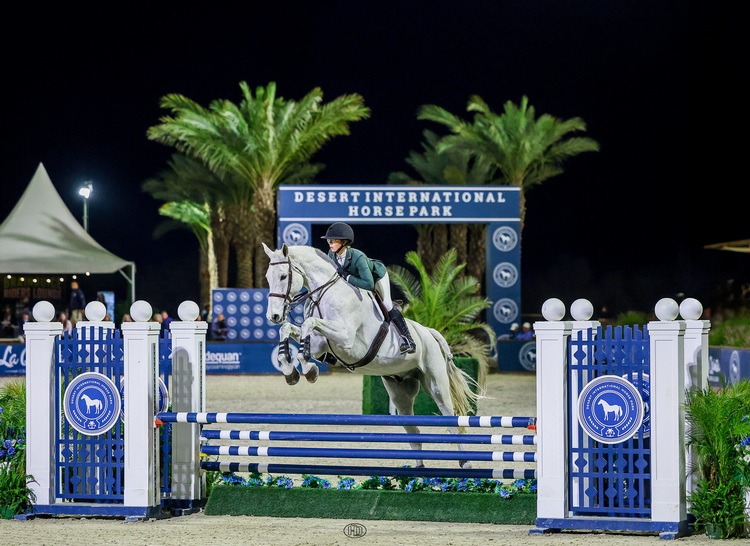
Schuyler Wireman on her way to winning the $100,000 Pro Equitation Challenge (High Desert Sport Photo)
It was only a little less than one year ago that Skylar had her introduction to a major championship at the FEI Show Jumping World Cup Finals in Riyadh, Saudi Arabia.
“It was my first FEI show out of the country; my first show internationally was the World Cup Finals,” she reflected, still seeming to be a bit amazed.
“It was a great takeaway, being able to watch so many of the top 10 in the world.”
In an imposing, unfamiliar setting, she was clean and fast with her 10-year-old Tornado (Diarado X Chacco Blue) to finish tenth in the first round and earn the admiration of other countries’ chefs d’equipe. In the second round over bigger fences, however, lack of mileage for horse and rider showed. With four rails down in that leg, Skylar wisely decided not to contest the even more difficult third phase.
As she explained at the time, “Tornado is inexperienced at this level and having studied our round on Thursday and talked extensively to my coach and many others whose opinions and experience I have high regard for, I will not risk his welfare or his future in the sport by asking Tornado to jump a course he might not be quite ready for.”
Smart. That’s Skylar.
The experience overall benefited Skylar and her mount, however.
“I came home with an even better horse than I went with. He really learned a lot there, as much as I did. It was a huge growing week for us.”
They proved that by jumping four clear rounds in a row at Thunderbird in British Columbia upon their return.
She noted that before Riyadh, “if he was impressed, he’d kind of hurl himself over the jumps, rather than opening up and following through behind.”
He finally figured it out over the big fences in Saudi Arabia.
When they came home, “he had a whole new hind end. He found the shape of his body and a true correct bascule over the jumps,” said Skylar.
She has always had to work for what she got. Her mother, Shayne Berridge-Wireman, acts as both her trainer and her groom when necessary, and together they make things happen from their base in San Diego County, Calif. Being women going to the Middle East last year for the first time may have seemed a bit intimidating at first, but as Shayne noted, everyone was very nice and they felt welcome. In Abu Dhabi, where the hotel staff was the friendliest they had ever encountered, the U.S. group even visited a mosque.

The team visits a mosque in Abu Dhabi. Skylar Wireman is fifth from the right. (Photo courtesy Lizzy Chesson)
“We were more comfortable coming to the Middle East because we had done it once. We knew what to expect and how it works, so it was a lot less stressful in the preparation,” Shayne said.
Skylar’s work ethic has made her a standout, and she caught the eye of Olympic team gold medalist Peter Wylde during the U.S. Hunter Jumper Association’s Emerging Athletes Program finals when he was 14 in 2019.
“She had really good instincts as a rider,” recalled Peter, noting Skylar had also impressed in the stable management portion of the competition.
It can be hard to evaluate someone in the EAP, because they are on borrowed horses, some of which are easy and some of which aren’t, he commented.
But “every time there was a problem situation, Skylar’s reactions were correct,” he said.
“She had the most appropriate instinct of what to do when it wasn’t going the right way. As an athlete, she has incredible body control,” he continued, noting she had also been a gymnast.
She didn’t win the final, because of a mistake in the last line of the ride-off, but her talent had made its mark with him.
Skylar and her mother had asked after EAP if Peter could work with them, but at the time, he was too busy. And then Covid hit. With everything shut down, he had the time to give Skylar.
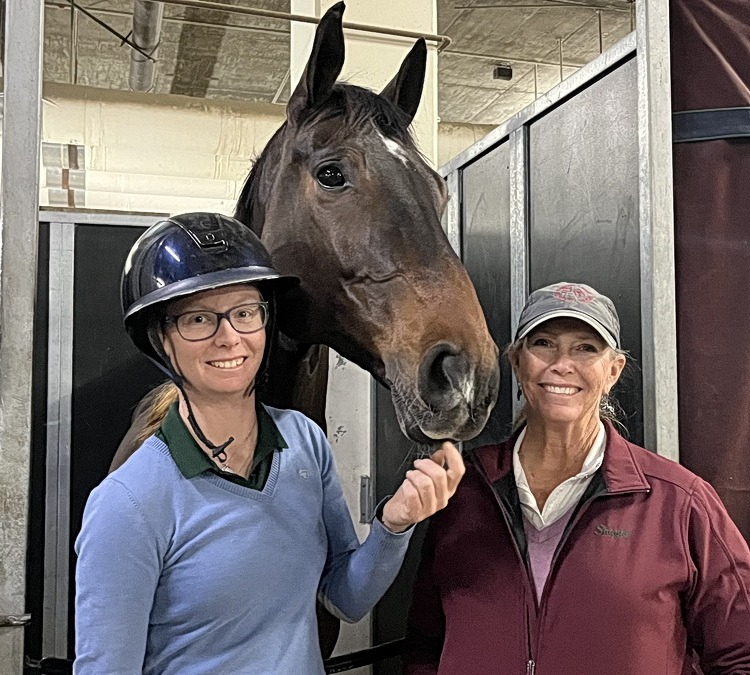
Skylar and her mother Shayne Berridge-Wireman with Coolio 23. (Photo © 2024 by Nancy Jaffer)
Peter invited the Wiremans to his base in Wellington, Fla., where they stayed in his guest house. He was sharing a stable with international show jumper Lauren Hough, who let Skylar ride one of her jumpers in addition to a hunter being trained by Peter. Mark Phillips, the former U.S. eventing chef d’equipe, was also on the scene and gave Skylar flat lessons.
“Everybody’s like, `This kid is really good.’ It cemented in my mind that she was as talented as I thought she was when I saw her at the EAP,” Peter said.
She’s been busy accumulating honors. Skylar was the U.S. Equestrian Federation’s Junior Rider of the year and topped the 2020 Platinum Performance/ USEF Show Jumping Talent Search Finals West at age 15.
While she didn’t win one of the major indoor finals, finishing second in the Medal and the Washington after working with Andre Dignelli, Peter noted that McLain Ward and Beezie Madden went up to Skylar and said, “Don’t worry. We didn’t win a finals either.”
Explaining his involvement, Peter said, “I feel like she’s exceptionally talented. They have a very low budget and I know it’s going to get better at some point and they already have gotten some money behind them. Skylar works as hard as anybody to get where she’s gotten so far.”
She and her mother make their budget work by pitching in with their own braiding, transport, grooming and stall cleaning . The budget also determines their choice of shows.
“We have to go where she has a shot of paying back the entries,” said Shayne, explaining their financial strategy.
In the spring of 2023, Skylar took over the ride on Tornado, known as Tomato around the barn. He was going to be a jumper for top hunter competitor Nick Haness, but he gave Skylar the ride after breaking his wrist.
She had success with Tornado in the jumpers, despite being sidelined for six weeks with a lacerated liver she suffered when another horse stepped on her after a fall. Nick enabled her to keep Tornado until November of that year, when a group of friends and family were able to purchase the Swedish warmblood for her at the 2023 Las Vegas National on the Thursday, just before she rode in the World Cup qualifier two days later. She was eighth there and then went on to the Cup qualifier in Fort Worth, Texas, where she won and earned points to qualify for Riyadh. Skylar is also hoping to make the cut for this year’s Cup finals in Switzerland next month.
What makes her so good?
“She consistently sees the confident forward distance and is able to get the horse to that distance,” said Peter, who doesn’t charge fo his work with her.
“I call it pro bono,” he said.
“He’s so easy to work with,” said Shayne, noting that even though she is her daughter’s trainer, she defers to Peter “because he knows so much more than me.”
For her part, Skylar commented, “to have someone with such knowledge and expertise helping me is really amazing, and for him to do it all because he wants to.”
From Peter she has learned, “finesse and (that) small things can really make a big difference.” He has also mapped out a show schedule that enables her horses to be at their peak when it really counts.
And he introduced her to Boyd Martin, the Olympic eventer he helps, who aided her in getting a Purina sponsorship. She is also grateful for help from Mary Jo and Todd Kaplan, who own one of her horses, Karen.
Looking back on Abu Dhabi, Skylar mentioned the special dynamics of an all-female team, and noted they did some fun things, such as camel riding and falconry on a desert adventure tour.
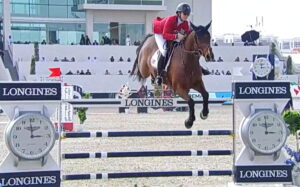
Skylar and Tornado in Abu Dhabi.
But they were all business for what mattered most. Skylar noted that her time on a Major League Show Jumping national team in the U.S. had been good experience for riding for her country in Abu Dhabi. But being part of the U.S. squad in the Longines League raised the stakes.
“It adds an element of pressure knowing that your team is relying on your round. You have to be really on point and it takes a lot for all the stars to align for everyone to have that perfect round to end up on top,” Skylar emphasized.
Shayne recounted that Robert Ridland defused tension by giving the team a pre-game pep talk, saying that while they were a little bit the underdogs, “We’re going to ride California strong and for the fires,” referring to the blazes that devastated the southern part of the team members’ home state recently.
“It was a great pleasure working with Skylar at her first CSIO 5-star,” said Lizzy Chesson, the USEF’s managing director of show jumping.
“She is an extremely hard-working, talented and dedicated young woman who really maximized her experience in Abu Dhabi. Her curiosity and desire to learn was remarkable. I truly hope she continues to find backers within the sport that help her achieve her potential.”
When the team didn’t qualify for the second round, “Everyone was disappointed, but everyone was grateful for the experience,” said Skylar, noting the U.S. squad did have the second-fastest first round time of all 11 teams. The riders rightly considered that an achievement.
And at her next team event, she will be able to bank on her first experience.
“It’s a whole different animal to put on that pink coat for a team event versus the World Cup, where it’s every man for himself,” she explained. “I like the team, I like the pressure, it’s well-suited for me.”
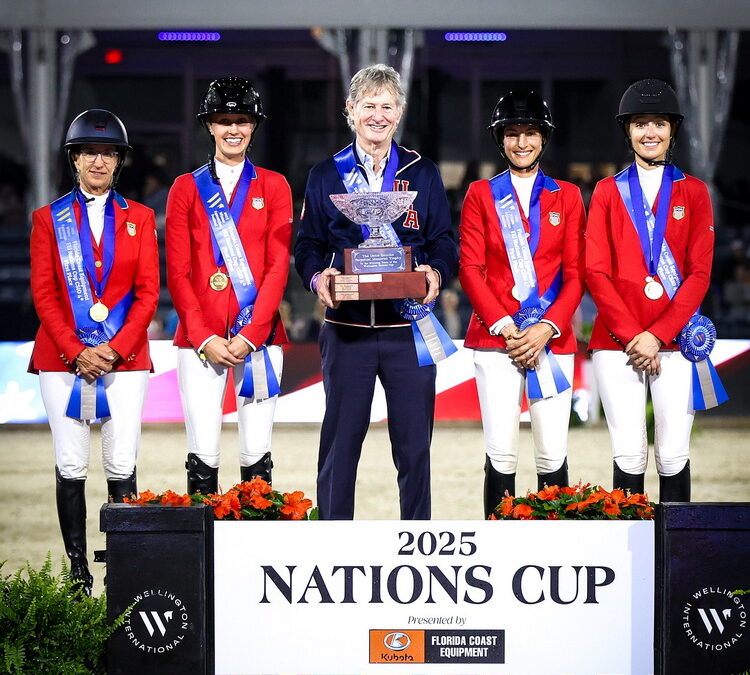
by Nancy Jaffer | Mar 1, 2025
The U.S. Show Jumping Team took its tenth victory in the $150,000 Nations Cup in Wellington, Fla., Saturday night. The only all-female squad in the competition accumulated a mere 5 penalties, and the margin was so good that anchor rider Laura Kraut didn’t even have to go in the second round.
Ireland was second with 12 penalties, but its chef d’equipe, Michael Blake, got even with U.S. coach Robert Ridland by dousing him with the celebratory bottle of champagne presented during the awards ceremony. Belgium was third on 17 penalties.
Both Ireland and Belgium had one rider each eliminated in the first round, so they had only three competitors to go in the second, run over the same course as the initial effort in the International Arena at the Wellington International showgrounds. Teams from nine countries competed, but the rules called for only eight returning in the second round, so Israel finished ninth.
As usual, Robert gave less-experienced riders a chance to get Cup mileage in this competition. Carly Anthony on Heavenly W was one of only three people in the class to go double-clear.
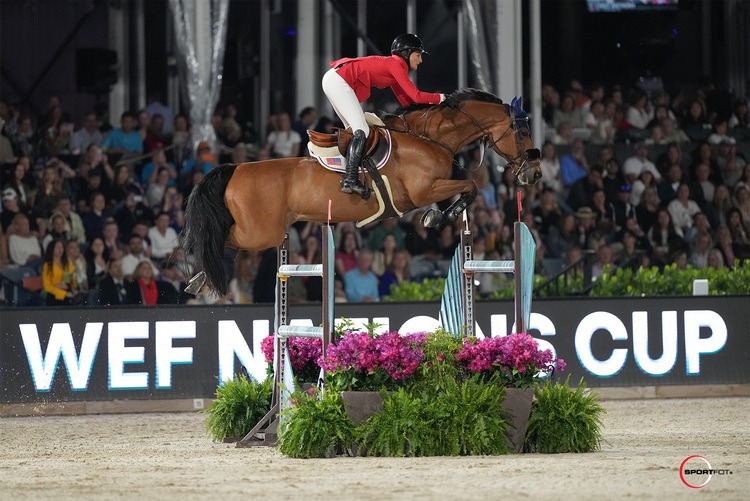
Carly Anthony was double-clear for the U.S. with Heavenly W. (Sportfot photo)
Robert celebrated woman power.
“What we really like is American girl power beating Irish boy power,” he said with a chuckle.
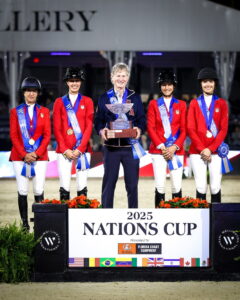
The U.S. team: Laura Kraut, Natalie Dean, Robert Ridland, Carly Anthony and Charlotte Jacobs (U.S. Equestrian)
The pressure was on Charlotte Jacobs as last to go with Playboy JT Z.
“I knew my horse jumped great in the first round, so I just wanted to repeat that performance,” she said, adding only a single time fault in the second round to her clear trip in the first.
Also on the team was Natalie Dean with Acota M, clean in the first round and a single rail in the second.
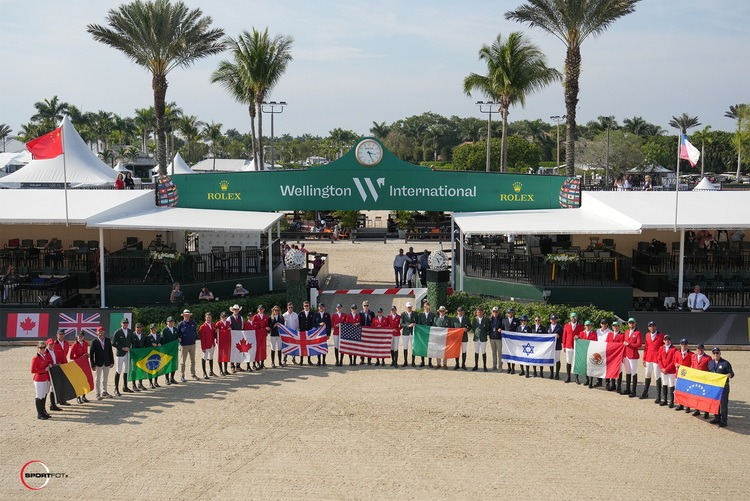
The lineup of countries for the Nations Cup (Sport fot photo)
This was Laura’s ninetieth Nations Cup outing, but her first with Tres Bien Z. She had the drop score, when there was a problem at teh one-stride combination after the water jump. Although they cleared the obstacle on a second try, the mishap and time faults made her the drop score.
But as always, the 2008 Olympic team gold medalist had an upbeat comment.
“This was incredible,” she said.
“From the beginning, when Robert told me who the team was, I was really pumped. These are three amazing riders who have been on fire now, not just recently, but working for years to get here. The way they rode the first round was textbook and just so impressive,” she observed.
“To come back the second round and do the same — I’m grateful to them for being the great riders and tough competitors they are.”
Click here for results

by Nancy Jaffer | Feb 21, 2025
An innovative arrangement to spearhead the USA’s high performance three-day eventing efforts will be led by Leslie Law, who has been serving as the country’s eventing development coach. He becomes the team’s chef d’equipe while taking on the role of high performance manager for the Defender U.S. Eventing Team, working with Karyn Shuter. She fills a newly created spot as U.S. Eventing high performance adviser.
Leslie earned the 2004 Olympic individual eventing gold medal in Athens, where he also was a team silver medalist for his native Great Britain. In the chef role, he succeeds Bobby Costello, who did not seek renewal of his contract after it expired last November.
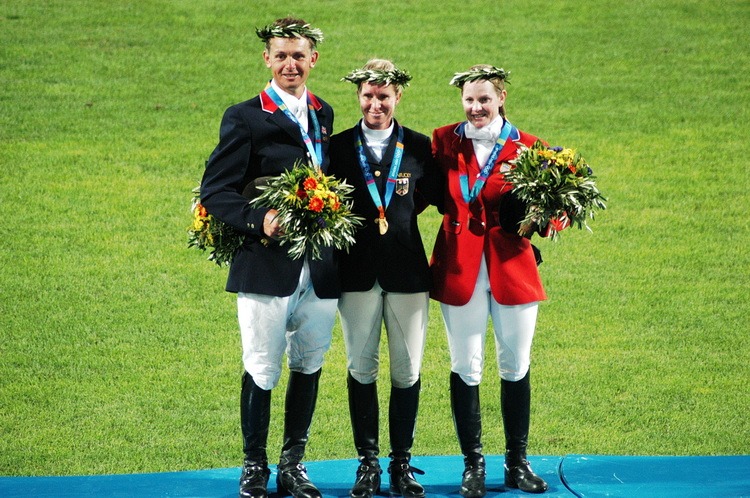
Leslie Law on the podium at the Athens Olympics, where he won individual gold and team silver. (Photo © 2004 by Nancy Jaffer)
Karyn evented for New Zealand, but is best known for working with Britain’s former world number one eventer, Oliver Townend. In his words, she has done “everything—entries, bills, owners, sponsors, riding and training” for approximately 15 years.
She is one of the owners of Ballaghmor Class, the horse on whom Oliver has won the Defender Kentucky 5-star and most recently the Maryland 5-star.
In addition to working with Oli, “She has helped other athletes,” said Hallye Griffin, the USEF’s director of FEI/High Performance Sport.
While Karyn may also be helping those athletes elswhere on occasion, Hallye said USEF conflict of interest policies will apply, which means “when she’s working for us, she’s working for us. There will be times when she is not working for us,” which means she will have “an allowance to advise others” in those instances.
Hallye noted the eventing leadership selection process was “extremely athlete-driven,” saying they are “really, really excited about Karyn coming on board along with Leslie.”
She added, “The athletes were a big piece of this… (they) were really driving this process. When it came down to it, it was, you know what? We think we need two people.” Looking at other countries, Hallye pointed out, “having more than one person (in a leadership position) is not uncommon.”
Tamie Smith, who in 2023 became the first U.S. rider to win the Kentucky 5-star since 2008, noted that “As riders, we are very excited with the selection of Leslie Law and Karyn Shuter as the leaders for our high-performance goals.
“After an extensive and thoughtful evaluation process, we believe their combined expertise and passion will inspire our team to achieve new heights. We extend our gratitude to USEF for their support and for allowing us to be a part of this process.”
While Leslie has “so much knowledge of the talent of the U.S. and our operations and the programs and the athletes and the horses,” Hallye said, “Karyn is going to come in with a slightly different outside perspective and have a lot of insights into what some of the other top athletes around the world are doing, and seeing where we can increase or level up our programs to get some extra edge for the future.”
Karyn is based in the United Kingdom, but she will be traveling to the U.S. for various events,, home visits and other occasions.
Added Hallye, “There is a lot that is still evolving. This is a re-structure for us to have a high performance advisor. She and Leslie and our athletes have all been super honest with understanding there might be some things within job descriptions that have to evolve.
“As they get their footing, Leslie and Karyn really have to get feedback from everyone as to where these programs need to be going. They’re both excited to have a team of people here.”
Leslie, who has continued to compete in recent years, noted that “Having supported the USEF eventing programs and teams for more than a decade, I have a clear understanding of our depth of talent and ability. I’m honored the athletes supported this transition and are confident in this new structure. With Karyn coming into the fold, alongside our program staff, we are starting this new quad heading in the right direction with the same collective goals in mind.”
“Having supported the USEF eventing programs and teams for more than a decade, I have a clear understanding of our depth of talent and ability,” said Leslie.
“I’m honored the athletes supported this transition and are confident in this new structure. With Karyn coming into the fold alongside our program staff, we are starting this new quad (quadrennium) heading in the right direction with the same collective goals in mind.”
For her part, Karyn stated, “The U.S. has a longstanding and successful history in the sport of eventing and a lot of untapped potential. I’m looking forward to the future with this program and to contributing to supporting the athletes and identifying ways we can improve performance at the international and championship levels.”
Shuter will work with athletes and stakeholders on performance plans, while supporting Leslie in developing a long-term strategy to produce sustained success. It’s all about strategy in their case, since neither of the positions involve training roles.
Christina Vaughn, who worked with Leslie on the eventing development programs for the past decade, will become USEF eventing elite program director and team leader. Leslie and Karyn will report to Amber Braun, USEF’s managing director of eventing.
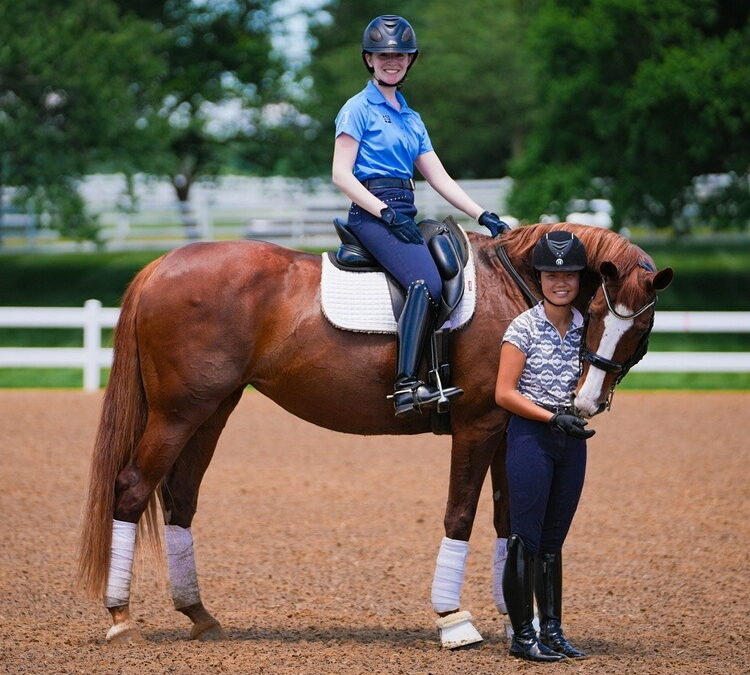
by Nancy Jaffer | Feb 20, 2025
Trainer/rider Nicole DelGiorno is concerned about why more children and young people aren’t riding dressage in the U.S., even as the hunter/jumper/hunt seat equitation ranks are crammed with kids.
A four-time North American Youth Championships medalist and board member of the Dressage Foundation, Dressage4Kids and Dressage at Devon, she began her learning process with the U.S. Pony Club. Nicole, whose specialty involves developing youth riders and young professionals, is a U.S. Dressage Federation Bronze, Silver and Gold medalist. She also has served as chef d’equipe for Children’s and Junior teams.
She took to social media to diagnose the problem, airing her thoughts on why more U.S. kids aren’t riding dressage. It goes without saying that it is important to have young people coming up through the pipeline so eventually they can represent their country at championships, such as the Olympics. The grassroots are key.
“My goal is to start the conversation,” Nicole told me. While some people do discuss the subject, she believes “it’s a matter of everyone coming together deciding what the right course of action is.” She mentioned that without reinventing the wheel, “There are so many great examples,” to provide inspiration, such as what the American Quarter Horse Association does for its kids.
While some USDF GMO’s (Group Member Organizations) offer age-appropriate schooling show competitions, Nicole noted that is “really dependent on your local GMO and how active and creative they are.” One bright spot in USDF’s Region 1 ((Delaware, Maryland, New Jersey, North Carolina, Pennsylvania, and Virginia) is Lendon Gray’s Youth Festival for riders 25 and under, to be held Aug. 8-10 at the Horse Park of New Jersey. The only other similar festival, according to Nicole, is in Georgia.
Nicole, who is based in New Jersey, offers some intriguing insights. She contends “the recognized youth divisions in U.S. dressage are structured terribly, and that is definitively why we cannot get more kids in dressage.”
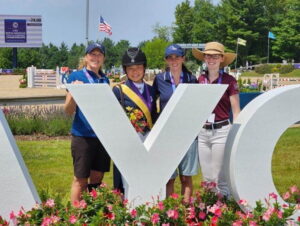
Nicole with her former student and current assistant, Quinn Ridgway, at the North American Youth Championships with Quinn’s family.
She illustrated the situation with this theoretical example:
“You are a non-horse parent with a 6-year-old kid that loves horses. You type `horseback riding lessons near me’ into a search engine and start investigating. Ninety percent of the programs that show up offer instruction in hunt seat equitation. Must be popular! You see that the highest-rated barn offers a summer camp and you decide to send your child. She loves it and starts making friends with the kids who ride at the barn. She begs for weekly riding lessons. She takes lessons one to two days a week until her trainer mentions that she is really getting quite good. She should start to compete.
“She does the leadline division and gets exposed to an environment like the Devon Horse Show. Dreams ablaze in her heart, she asks if she can have a pony of her own, but your family isn’t ready for that type of commitment.
`No worries,’ says the trainer. `You can lease our small pony.’ Then she ages out and you lease the medium pony…or the large pony… or the junior hunter.
“But at some point, your kid is getting quite good and the trainer helps you buy a competitive A-circuit equitation horse. Your daughter goes on to place well at several big championships, catching the attention of a noted trainer who offers to take her on as a rider. She goes on to become an assistant trainer, or to cruise happily around the amateur divisions. The End.”
Nicole observed that storyline involves, “Everything curated. Everything clear. Their goal is to not overwhelm parents, because there is real money in developing youth riders in hunter/jumper land and real milestones to attain from the time the kids are little. When that’s true, the trainers are happy and structure their programs to make parents and children happy.
“Now, let’s say your first call was to a dressage barn,” Nicole continued.
“Nine times out of ten, that conversation is going to go like this: `Hello! I am inquiring about riding lessons for my 6-year-old daughter.’ ….`Hi! Does she have her own horse?’ …`No, we don’t.’ `Sorry, can’t help you.’”
Nicole goes on to illustrate another scenario, in which the parent calls one of the 10 percent of dressage barns that can accommodate beginner children.
“Your kid takes riding lessons there for two years. In her third year, she might do some dressage schooling shows at Introductory Level. Your trainer may even take her to some unrated hunter/jumper shows because the format is easier, cheaper and she can get more ring time. Next year, your kid begs to show recognized at Training Level. At only 10 years old, she really does quite well on the barn’s lesson pony. She qualifies for Regional Championships.
Continuing, Nicole suggested, “When you arrive in the warmup for your first class, you see your child’s eyes widen to saucers. She rides over to her trainer and asks in hushed tones, `Is SHE in my class?’
`Yes, my dear, SHE is.’ Your eyes slide over to the 21-year-old rising professional riding her client’s young horse, who appears to be the second coming of Glamourdale. The class commences. Your kid rides her heart out on her lesson pony (you had tried to find something nice for her to lease for this year, but no luck finding a quality seasoned dressage pony for lease). Still, even with her best test of the year, she places third to last with a 62 percent. The young pro wins with a 74 percent. Not because your kid isn’t great and skilled for her age, but because there is a chasm in terms of experience and physical ability between a 10-year-old and a 21-year-old.
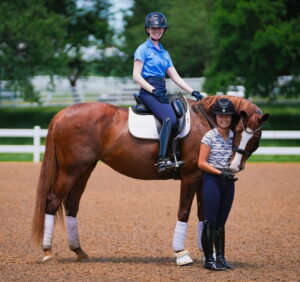
Nicole DelGiorno with her former student Quinn Ridgway, who is now her assistant. (Photo by Priceless Equine Productions)
“This is what it is going to look like for the next few years until you buck up and buy a pony for her to do FEI Children’s or Ponies (probably from Europe, because that’s the only place to reliably find a competitive pony that’s actually been shown and proven by a kid). Sure, you could aim at Dressage Seat Equitation Medal Finals, which has a 13 and under division… if you have one of the few 10-year-olds who can ride First Level inside out and backwards, and you can find a size-appropriate mount for her to do it on.”’
She suggested splitting Youth Division classes at Second Level and below according to the rider’s age, noting it wouldn’t cost more than few extra sets of ribbons.
For Dressage Seat Equitation, her idea is a Walk-Trot Equitation class aimed at beginner riders with an Introductory skill set; Walk-Trot-Canter aimed at novice riders with a Training Level skill set and then Advanced Equitation.
It “would keep the current standards for riders with a First Level skill set and feed into the Dressage Seat Medal Finals.” Nicole also would like to see a Pony Division split according to size.
To read more of her suggestions, click here.
The problem, as Nicole sees it, is that “In general, we do NOT provide the Disney experience to families like the hunter/jumper community does. We do not structure our divisions to give kids appropriate milestones (Why not have an equitation class that is just Walk/Trot like they do in hunter/jumper land? Why can’t we get out of our own way and reward correct basics without making the kids do leg yield, zig-zags and counter-canter and three changes of lead through trot on the diagonal?)
“Because the way our youth divisions are structured is so challenging, no trainer really wants to structure their business around it. It’s a bad gamble that will almost assuredly result in a ticked-off parent and a disappointed kid. Much easier to help adult amateurs…pursue their medals.”
She emphasizes what is at stake for the discipline: “We want to see more kids riding dressage. We want to see better horsemanship and depth at every level of the sport. Then where is the space for younger riders to compete, learn and connect with their peers? Where are the milestones for them to aim toward?”
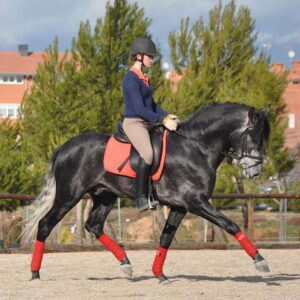
Nicole riding at Yeguada Susaeta. (Photo by Maria Ruiz Fernandez)
Nicole feels it’s crucial to address these issues, mentioning the concept of a USDF task force that could examine the subject and come up with ideas.
“Until we have an outlet for these young kids to showcase their skill and test their ability in classes that are structured fairly, I think we are going to continue scratching our heads and wondering, `Where are the dressage kids?’ ”
Anyone who thinks they have answers and wants to continue the conversation Nicole started may contact her at nicole.delgiorno@gmail.com.
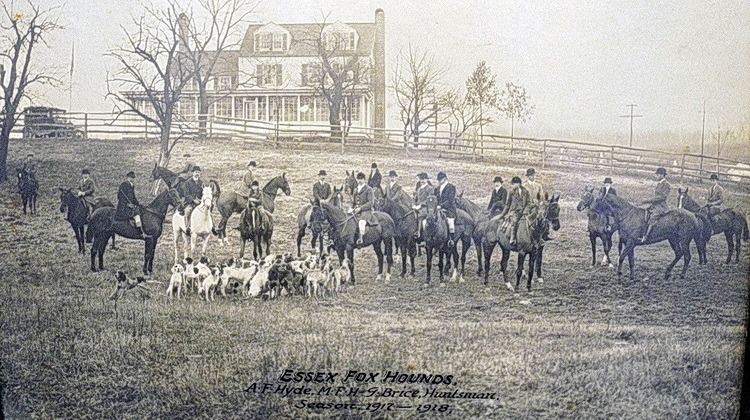
by Nancy Jaffer | Feb 13, 2025
About 30,000 or so people go to the Far Hills Race Meeting in New Jersey’s Somerset Hills each October, enjoying an occasion that is social as well as sporting.
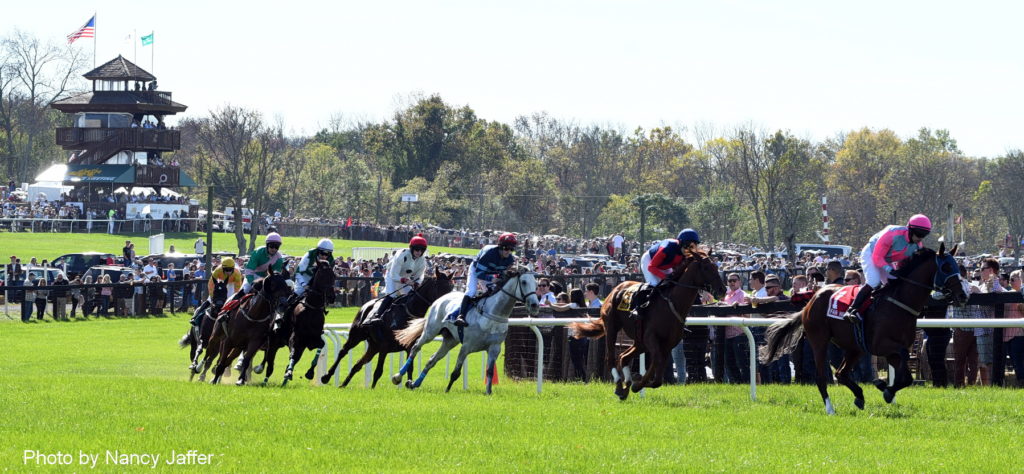
The Far Hills Race Meeting, with roots in the early 20th Century, always draws a big crowd. (Photo © by Nancy Jaffer)
But who among the steeplechase fans these days has any idea that the glitzy tailgating opportunity, with its abundance of champagne, bountiful buffets, sleek thoroughbreds and silver trophies, came from far simpler origins in the early twentieth century?
Barry Thomson, a historian and author who grew up in the Somerset Hills, laid out the evolution of the race meeting as part of a recent lecture about the rich history of equestrian pursuits in the area. It is the home of the U.S. Equestrian Team Foundation, the Essex Horse Trials and the Essex Fox Hounds, as well the scene of the 1993 World Pairs Driving Championship.
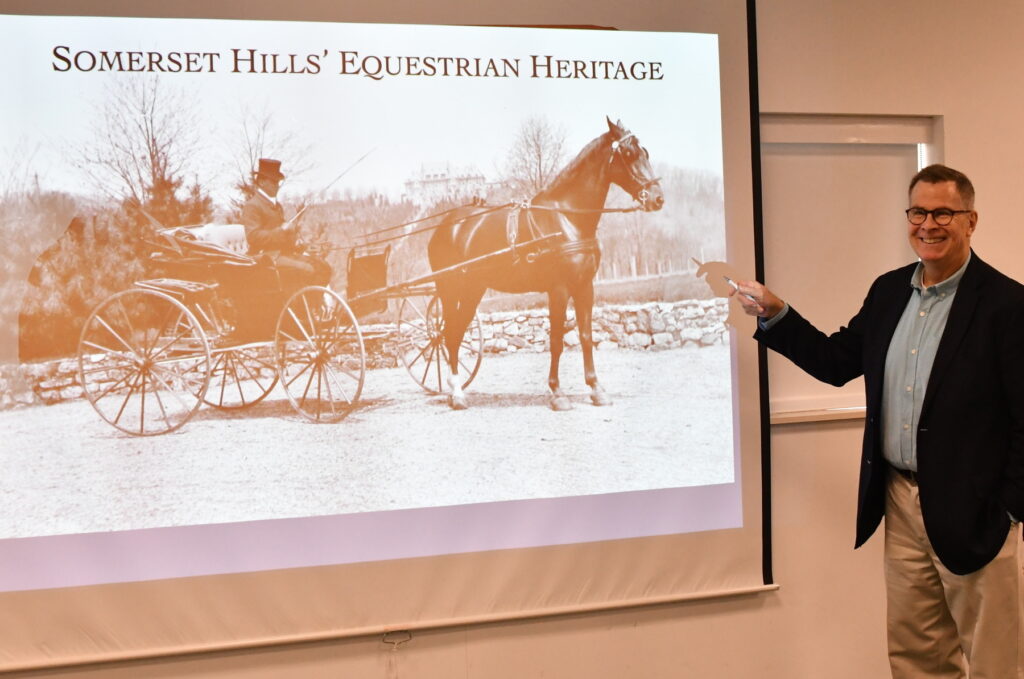
Historian Barry Thomson. (Photo © 2025 by Lawrence J. Nagy)
After the Civil War, horses gained a role different from their traditional use, as equine recreation became an important pastime for members of the new, wealthy upper class, who modeled themselves on British gentry. They rode, drove coaches and carriages, went foxhunting and played polo.
So in the second half of the nineteenth century, as Barry pointed out during his presentation at Bedminster’s Clarence Dillon Library, horses gradually went from being simply a utilitarian method of transporting people and goods or playing a role in agriculture to becoming prestigious mainstays of sport.
The Somerset Hills was a farming area that underwent major change beginning in the 1870s, when it became accessible via passenger trains, making it easy to go from New York and Newark to Bernardsville, and by 1890 with access to Far Hills and Peapack & Gladstone, which was then a part of Bedminster Township.
According to Barry, with the advent of convenient train travel, the thinking of the upper class ran, “We want country estates, let’s go out there. We can get there easily.” Also important was the fact that the region hadn’t been compromised by heavy industry. So magnificent estates such as Natirar, now a county park, and banker C. Ledyard Blair’s Blairsden, still in private hands, sprouted throughout the area.
(Barry will be giving more historical lectures this month. They are at St. Luke’s Episcopal Church on Main Street in Gladstone Feb. 20 at 7 p.m., which is free of charge, and Feb. 23 at Pendry Natirar in Peapack. That talk, which is about Natirar, is a luncheon fundraiser with a $150 admission fee, co-hosted by the Historical Society of the Somerset Hills. Click on this link for more information.)
Coaches that were refined versions of British mail and stage coaches were popular with the wealthy, who enjoyed drives from New York City in the days before bridges and tunnels, putting the horses and vehicles on ferries as they headed to Blairsden. They didn’t always make the round trip on the coaches, however, with passengers sometimes opting for the easier route of taking the train back to the city.

A four-in-hand of the Somerset Hills gentry. (Photo courtesy of Barry Thomson)
The popularity of the coaches set the stage for the Gladstone Driving Event, which gained international fame in the 1980s and 1990s under the direction of Finn Caspersen, former chairman of the U.S. Equestrian Team, whose advocacy of combined driving brought competitors from overseas to Gladstone.
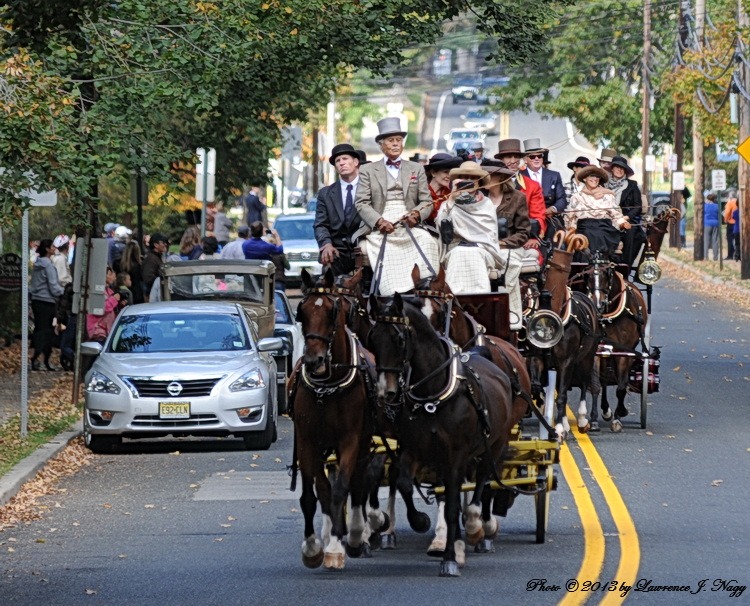
The late Lou Piancone kept the Somerset Hills’ tradition of carriage driving into the 21st Century. (Photo © 2013 by Lawrence J. Nagy)
James Cox Brady in 1917 built the memorable stable that once housed his many coaches and horses. It now is the headquarters of the U.S. Equestrian Team Foundation. For years, it served as a training center for the country’s Olympic riders, and today is the scene of various competitions, including the Platinum Performance/USEF Show Jumping Talent Search Finals East.
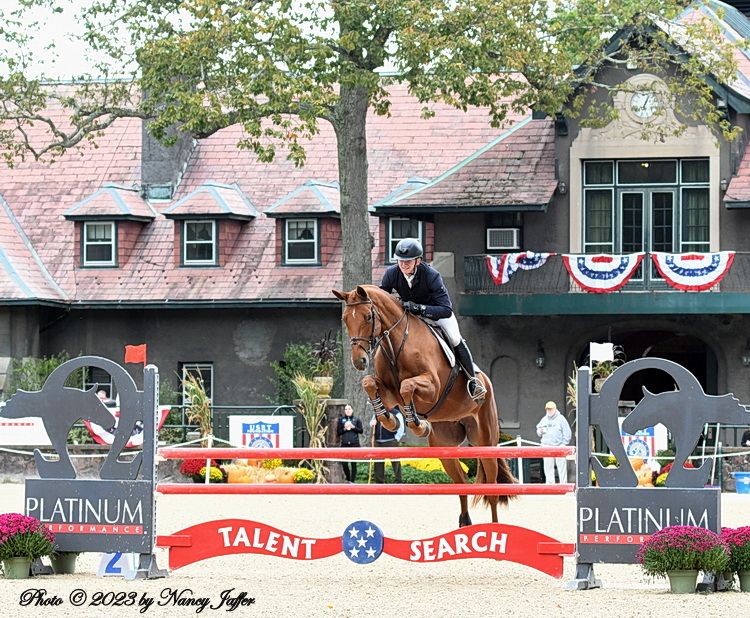
The magnificent stable built by James Cox Brady offers an impressive backdrop for competition. (Photo © 2023 by Nancy Jaffer)
Fox hunts enjoyed increasing popularity beginning in the 1870s, due to links with other horse sports, steeplechase racing and polo. The Essex Fox Hounds had their roots in Essex County, where there once was open land along the banks of the Passaic River before the city of Newark grew.
It was a drag hunt, with a scent laid down for hounds to follow. The Montclair Hunt became known as the Essex County Hunt as it moved to West Orange in the search for more acreage.
The hunt, complete with horses, hounds and equipment, had been purchased in 1890 by Charles Pfizer Jr., whose father was a founder of the well-known pharmaceutical company. He renamed it the Essex Hunt, which moved to Maplewood before finally leaving Essex County and then going to Morris County and finally Somerset County. In 1916, it settled in Peapack, where its stables and clubhouse remain. It gained a measure of extra fame in the 1980s, when Jackie Kennedy and her children would ride with the hunt.

The Essex Fox Hounds meet in 1917. (Photo courtesy Barry Thomson)
As Barry pointed out, having a good relationship with farmers “is an obvious concern for any foxhunting organization, because horses and hounds can unintentionally do great damage to crops, as well as scare the farm animals.”
To thank farmers for permission to ride over their property, the Essex County Hunt in 1884 started a tradition of races for farmers with a half-mile flat race at Newark’s Waverly Park, now part of Weequahic Park. The purse was $50, and it was open only to farm horses owned by farmers. Essex kept the tradition going as it moved. By 1903, the specification emphasized the race was for horses “other than thoroughbreds” working on a farm.
The Essex Fox Hounds took over its first farmers day race meeting October 1914 at its Peapack clubhouse. It offered a lunch followed by six horse races, including a quarter-mile fixture for farmers from Somerset, Hunterdon and Morris counties.
By 1919, lunch and entertainment for the farmers moved to the Far Hills Fairgrounds, which also was home to a horse show, gymkhana and fair featuring a flea circus and strolling gypsy singers. The horse races were held across the street at Grant Schley’s Fro Heim, another impressive estate. The races of the current century still are run over basically the same course at what is now known as Moorland Farm.
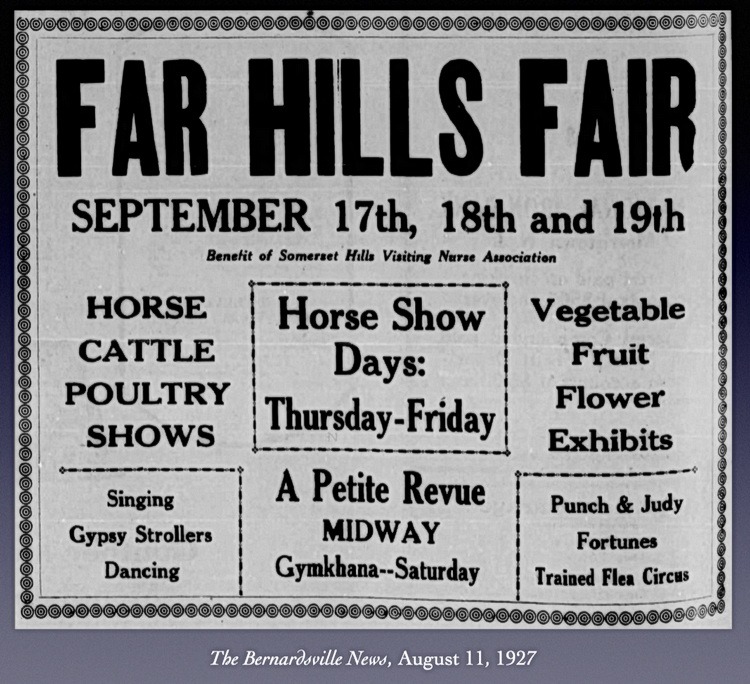
Far Hills Fair poster. (Courtesy of Barry Thomson)
But things have changed since the days of what were then known as “the hunt races.” Many people call today’s annual steeplechase in Far Hills the “hunt,” which the preceding history effectively shows is a misnomer, since the word refers to the races’ initial sponsor, not the event.
The races for farmers, their horses and $50 purses are long gone. The card of top-class competition at the Far Hills Race Meeting, set for Oct. 18 this year, includes flat racing and tests over hurdles, with $700,000 offered in purses in 2024.
The race meeting also has a gloss. In addition to coveted hillside parking spaces passed down through families, innovations have been hilltop tents (with the biggest going for $30,000) and a section known as The Hunt Club, with a DJ, mechanical bull and a mobile cigar lounge for a $50 ticket price.
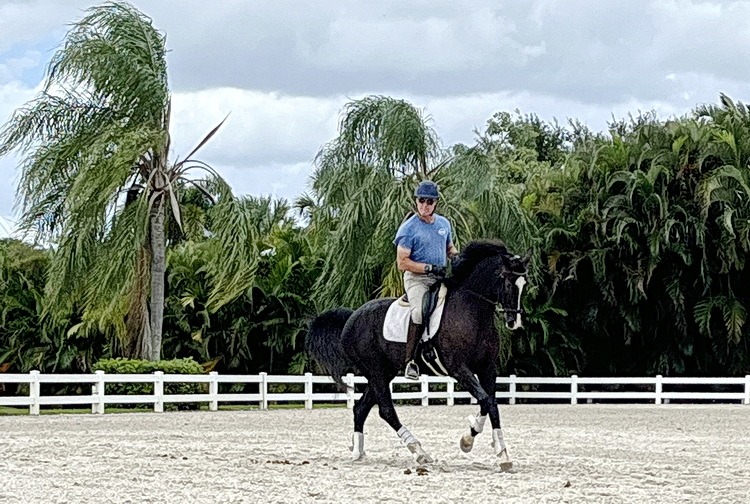
by Nancy Jaffer | Feb 4, 2025
The reins were loosened a bit on dressage trainer Michael Barisone Tuesday, as a judge gave him permission to conduct clinics further afield than he had been permitted to travel since being charged with second-degree attempted murder nearly six years ago.
The 2008 U.S. Olympic team alternate, Barisone was found not guilty by reason of insanity in the 2019 shooting of Lauren Kanarek, a tenant at his farm who also trained there. Barisone said he doesn’t remember the incident, which left Kanarek hospitalized after taking two bullets in the chest. The shooting occurred during a confrontation with Kanarek and her boyfriend, Rob Goodwin, who had been at odds with their landlord.
After time in psychiatric institutions following the 2022 verdict, Barisone was allowed to live in a private home in New Jersey beginning in 2023. Last August, Superior Court Judge Stephen Taylor permitted Barisone to go back to his farm in Loxahatchee Florida, but he was not cleared to drive there or go to any states other than Florida or New Jersey. Taylor was concerned because Kanarek was based at a farm near Barisone’s place.
Tuesday’s ruling in Morristown, N.J., was the latest in a series of Krol hearings, held to judge the progress of a criminal defendant who has been confined to a psychiatric institution following a verdict of not guilty by reason of insanity.
Barisone has done some teaching at his Florida farm, but one of his attorneys, Edward Bilinkas, told the judge that his client had requests from people in Texas and Indiana to give clinics, which would enable him to earn some money and “be able to get on with the rest of his life.”
Taylor said Barisone can do the clinics in those and other states, but must give the court a month’s notice that he intends to travel for such occasions. He also gave Barisone permission to drive his truck and a trailer from New Jersey to Florida, but an order prohibiting him to have contact with Kanarek and Goodwin remains in effect.
Tuesday’s hearing lasted approximately an hour, with much of the time taken up by testimony from Dr. David Landry, the Florida clinical psychologist with whom Barisone has met 10 times. Landry was seen on a screen in the courtroom, speaking via Zoom from West Palm Beach.
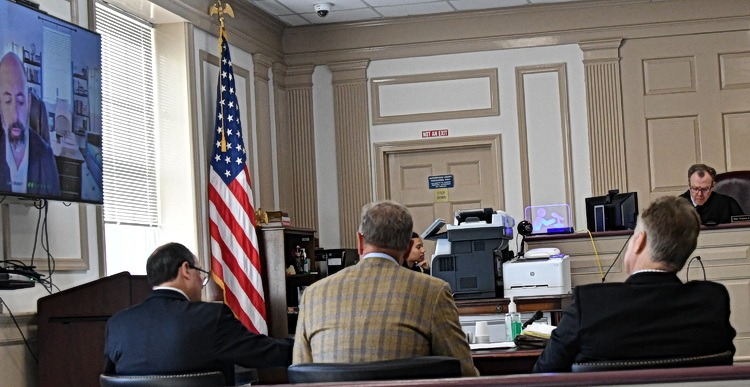
Dr David Landry on Zoom in the courtroom of Superior Court Judge Steven Taylor, as attorneys Chris Deininger and Ed Bilinkas watch with Michael Barisone. (Photo © 2024 by Nancy Jaffer)
Asked to describe his patient’s demeanor, Landry said, “Overall, Mr. Barisone presents as cooperative, pleasant, easily engaged. Very talkative in session.
“At times, he can be animated,” Landry continued saying “He is appropriate” and has not exhibited erratic behavior.
“I have not noticed any psychotic symptoms,” added Landry, who was questioned about Barisone’s situation by Morris County Supervising Assistant Prosecutor Christopher Schellhorn.
Of Barisone, Landry noted, “He has not demonstrated any delusional thinking…he consistently presents oriented, aware of his surroundings and cooperative with treatment overall.” The psychologist said he has not seen any signs of depression, traits of personality disorder or delusional thinking.
Asked by Schellhorn about a “historical” diagnosis of delusional disorder, Landry said that is a chronic condition which can go into remission. He mentioned another previous condition, that he and Barisone had discussed the feeling of being persecuted “and the resultant events that occurred.”
But he observed, other than that and the previously diagnosed persistent depressive disorder that is in remission, Barisone does not have any new conditions. While Landry does not believe Barisone is a danger to himself or others, and has “demonstrated ongoing stability,” he recommends that Barisone should remain in treatment with him.
Since returning to Florida, Barisone has spent most of his time working on maintenance at his property, where his fiancée, Lara Osborne, and trainer Justin Hardin have been among those holding down the fort.
“They’ve been winging it for five years and thank God, they kept everything together,” Barisone said.
He noted he had played the leading role in the farm’s operation, but then “one day I’m gone, and they had to figure everything out, and they did.”
Barisone waited a month after he arrived in Florida before getting on a horse again, but once he was back in the saddle, it felt as if he had never been away — although he admitted to being a little sore for two days after not riding for so long.
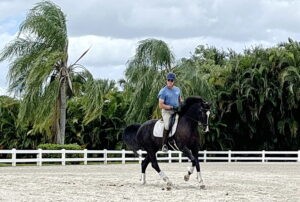
Michael Barisone finally was able to get back on a horse in Florida. (Photo courtesy Lara Hausken Osborne)
Barisone is excited about a 9-year-old Dutchbred named Kordaat that he owns and is continuing to train. He eventually wants to show the horse, but has been on an interim suspension since May 2022 for “allegations of misconduct” from the U.S. Center for SafeSport, an organization “committed to ending abuse in sports,” and he is not allowed to be on the grounds of licensed shows. Such suspensions last until a formal investigation ends and there is a final decision on a case.
Barisone’s next Krol hearing is scheduled for Sept. 9.




























